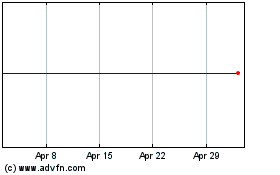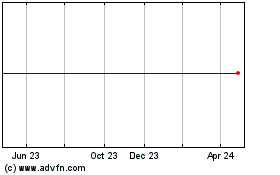Global Stocks Drop on Political Tensions, Worries Over Chinese Growth
October 23 2018 - 7:54AM
Dow Jones News
By David Hodari
Stocks sold off around the world Tuesday, with technology shares
plunging amid resurgent fears about the health of China's economy
and a slew of geopolitical concerns.
Futures trading pointed to 1.3% falls for the S&P 500 and
the Dow Jones Industrial Average, respectively. Nasdaq futures put
the tech-heavy index on course for a 1.5% fall.
Nvidia Corp. and Twitter Inc. were down 2.9% and 2.8%
respectively in premarket trading, echoing the heavy selling of
tech stocks that has been driving global equities indexes
lower.
The Stoxx Europe 600 was down 1.2% in late morning trading.
Germany's DAX index was down by 1.7%, partly as a result of a 7%
drop in Bayer shares, after a judge reduced the damages the German
company must pay in the cancer case related to its Roundup
weedkiller, but upheld the jury's finding that it acted with
malice.
The Stoxx's technology sector as a whole plunged 3.9%. Austrian
semiconductor firm AMS AG fell 27% after it surprised investors
with weak fourth-quarter guidance, while French IT firm Atos
dropped 23% after slashing its forecasts.
Downbeat European trading followed heavy selling in
Asia-Pacific, where investors reversed the broader market rally
that came Friday and Monday amid anxieties about Chinese economic
growth. Index heavyweight Tencent Holdings fell 4.6%.
In China, the Shanghai Composite Index and the Shenzhen A Share
closed down 2.3% and 1.9% respectively. Sinking financial stocks
dragged Hong Kong's Hang Seng down 3.1%. Indexes across the rest of
the region suffered heavy losses, with the main benchmarks in
Japan, South Korea and Taiwan slumping 2% or more.
Renewed pessimism about global tech stocks came after the U.S.
sector ended a run of three consecutive sessions of selling Monday.
Investors have turned their backs on riskier sectors such as
technology in recent weeks as they have found themselves at the
confluence of rising U.S. bond yields, U.S.-China trade tensions
and worries about global economic growth.
Those factors have combined to give investors a "glass
half-empty" approach to the current earnings seasons, according to
Ronan Carr, equities strategist at Bank of America Merrill Lynch.
"Globally, results haven't been bad, but the companies that miss
are getting hammered and even the ones that beat expectations have
been underperforming in the 24 hours after publishing."
Analysts cite rising bond yields as one factor behind the wild
equities swings of recent weeks, although those moves have
softened.
The yield on 10-year U.S. Treasurys edged lower to 3.152% from
3.196% late Monday. Yields and prices move in opposite directions.
But, while that move is to be expected from debt markets, "a growth
scare coming down the line is very bad for equities market," Mr.
Carr said.
The steep fall in Chinese stocks marked a U-turn from the
Shanghai index's sharpest two-day rise since 2015, which came as
investors parsed reassuring comments by key government and central
bank officials about the health of Chinese economic growth.
The People's Bank of China late Monday moved to support
financing for private firms, but the central bank's measures "are
far from sufficient to solve [those companies'] broad financing
difficulties," Citi economists said in a note.
Coming after government proposals to cut income tax, analysts
are uncertain whether such moves will prevent Chinese growth from
decelerating further.
"We're asking whether China is doing stimulus by a thousand cuts
but I'm still very skeptical," said Ian Samson, markets research
analyst at Fidelity International. "The ongoing slowdown is quite
natural but it will continue to weigh on global growth."
The Chinese yuan edged up 0.2% against the dollar, but remained
close to 21-month lows.
Investors in U.S. stocks and oil were keeping a close watch on
rising geopolitical tensions between the U.S. and Saudi Arabia
following the death of Saudi dissident journalist Jamal
Khashoggi.
President Trump said late Monday he wanted more information
about the death of Mr. Khashoggi but also voiced a protective view
of the U.S.-Saudi alliance.
Saudi Energy Minister Khalid al-Falih told Russia's TASS news
agency Monday that there was no intention to weaponize oil prices
and that production increases would proceed as planned.
The price of Brent crude oil was down 1.8% at $78.35 a barrel,
having slipped 3.8% over the past week to back below the important
$80-a-barrel level.
Market participants were also keeping an eye on the Italian
government's budget talks with European lawmakers--the two parties
remained on a collision course--and the U.K.'s contentious Brexit
negotiations.
Italy's FTSE MIB and London's FTSE 100 outperformed their
European counterparts but were still both down by 0.6%.
In commodities, the price of gold was up 1% at $1,234.08 a troy
ounce.
Write to David Hodari at David.Hodari@dowjones.com
(END) Dow Jones Newswires
October 23, 2018 07:39 ET (11:39 GMT)
Copyright (c) 2018 Dow Jones & Company, Inc.
Twitter (NYSE:TWTR)
Historical Stock Chart
From Mar 2024 to Apr 2024

Twitter (NYSE:TWTR)
Historical Stock Chart
From Apr 2023 to Apr 2024
